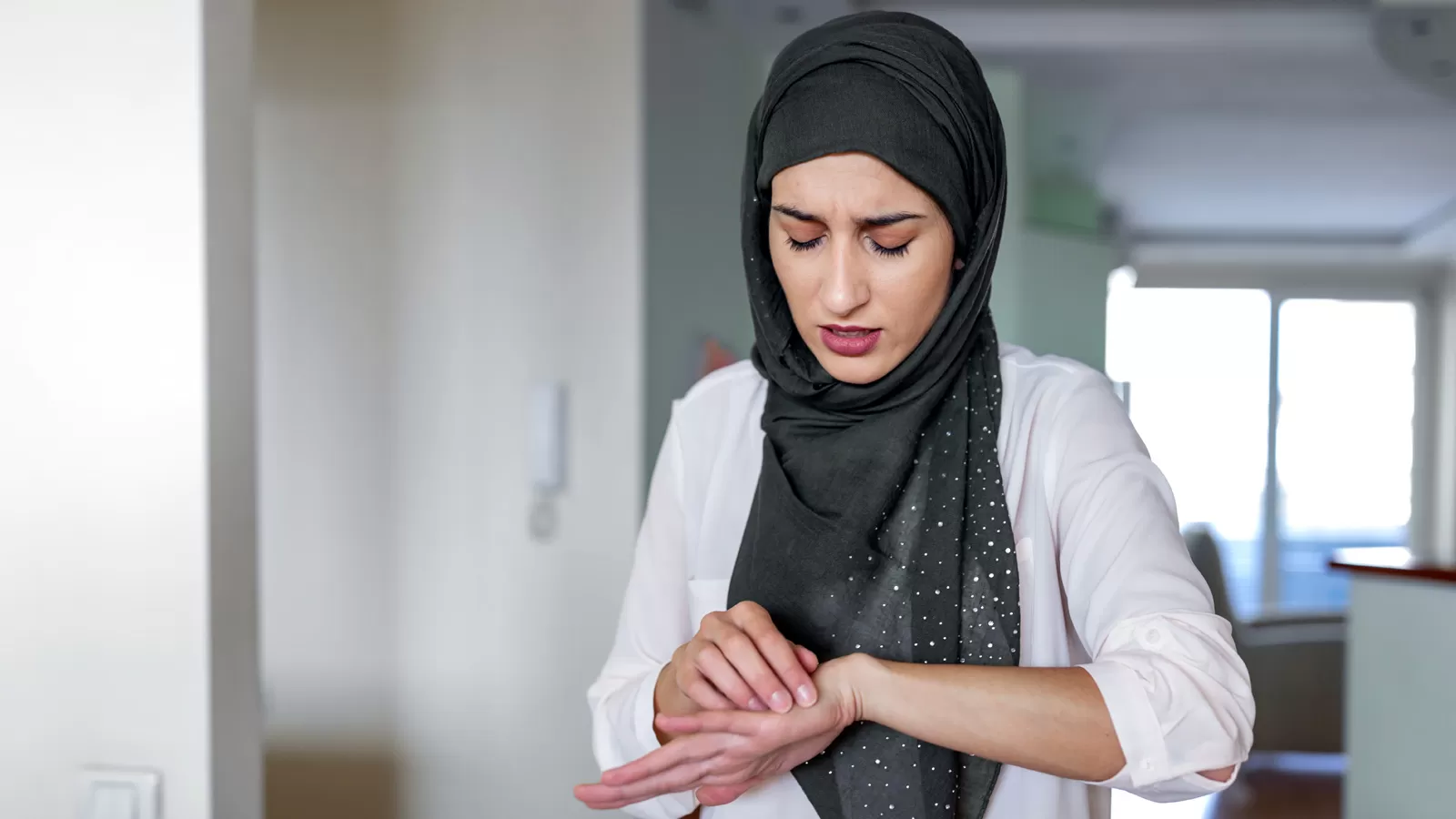Eczema vs. Psoriasis: What’s Causing My Itchy Skin?

Getting patches of red and itchy skin that may come and go could have you wondering: Is it eczema or psoriasis, and what’s the difference? Eczema and psoriasis are two distinct skin diseases that may require different treatment plans.1
Although they may be difficult to tell apart, a dermatologist (a doctor who specializes in skin conditions) can spot the differences between these two non-contagious and common skin conditions. That’s why it’s important to speak to your healthcare provider to get the right diagnosis.2-4 But it never hurts to be informed. Here are some basics about these two conditions.
The basics about psoriasis and eczema
Plaque psoriasis, the most common type of psoriasis, causes well-defined, thick, silvery-white, scaly raised patches, commonly found on areas like the elbows, knees, the scalp and lower back.2,3
Atopic dermatitis, the most common form of eczema, may look slightly different in children and adults.4,5 Eczema is typically very itchy in all who are affected.5 In children, eczema appears as a dry or scaly red rash, often in the creases (bends) of the elbows or knees.3,5 Adults with eczema tend to have patches of thicker or leathery skin, which can be in areas similar to those in children but also may occur on the face or hands.5
What are the key differences between eczema and psoriasis?
Three factors that really differentiate eczema from psoriasis are cause, age, and itch.6,7
Cause. Psoriasis is an immune-mediated condition, meaning your immune system becomes overactive. In this case, certain inflammatory cells cause the body to make new skin cells too fast. These cells pile up on the outer layer of the skin, leading to thick, scaly patches that can be itchy and painful.8
Although experts do not know the exact cause of eczema, they think it’s a combination of genetic and environmental factors.4 Similar to psoriasis, there is also inflammation in the skin.4,8 In eczema, the inflammation may be related to an irritant or an allergen that triggers the immune system to cause an eczema flare-up.4,9
Age. Eczema frequently develops in babies and children.5,9 Psoriasis often starts during early adulthood.7,8 However, people of all ages can experience these conditions.5,8
Itch. Another key difference between these conditions is the intensity of itching.3,5 With psoriasis, the itching may be mild to moderate.3,8 But for eczema, it is common, can be intense, and can affect sleep.3,9,10
Eczema up close

Eczema is a general term to describe a group of skin conditions that cause redness and inflammation, affecting at least 30 million Americans.11 Some 16.5 million adults have the most common form of eczema, atopic dermatitis (AD).9
The symptoms of AD are different for children than they are for adults.5 For children, eczema often appears as a rash that begins on the neck, elbows and wrists, or legs and ankles, and can cause intense itching.5,12 Eczema flares are often triggered by itching, which leads to scratching, inflammation, and then more itching. This is called the “itch-scratch cycle."5,9,13
Oozing and “weeping” of clear fluids may come from inflamed areas.5,9,10 Some children may have thick, leathery patches of skin.5,10
Childhood AD may go away or improve with age, but in some cases, the condition persists into adulthood.5,9 If that’s the case, the symptoms may appear as thickened or darker patches.5 In adulthood, AD can be especially bad around the eyes.5 Some common eczema triggers include dry skin, irritants (such as fragrances, soaps, or cigarette smoke), fabrics (such as wool and polyester) and stress.4
Psoriasis up close

Psoriasis has several subtypes, which affect almost 8 million American adults.8 Some 80% of people with psoriasis have “plaque psoriasis,” in which scaly, raised patches develop on the skin.2,14 Psoriasis is a chronic disease, and most people with the condition need to manage the condition over their lifetime.8 Psoriasis can also increase your risk of developing other diseases, such as cardiovascular disease or arthritis.15
Psoriasis may cause thick patches of silvery scales anywhere on the body, but these plaques appear most commonly on the knees, elbows, and scalp.2,8,16 Psoriasis can also affect the palms of hands and soles of feet, nails, genitals, and skin folds under the breasts and arms.8,16
Some common triggers for psoriasis include stress, skin injury, medications, and infection.17
Seeking the right treatment
Unfortunately, there are currently no cures for these skin conditions. The best most people can hope for is to find ways to manage the symptoms over a lifetime.8,13
Depending on several factors, including age and severity of the condition, a doctor may develop a treatment plan that includes a combination of medicine, avoiding triggers, and having a good skin care regimen and healthy lifestyle. It’s important to get the right diagnosis from a healthcare provider who specializes in these conditions, such as a dermatologist, and to develop a treatment plan that’s tailored to your specific needs.2,4,13,15




